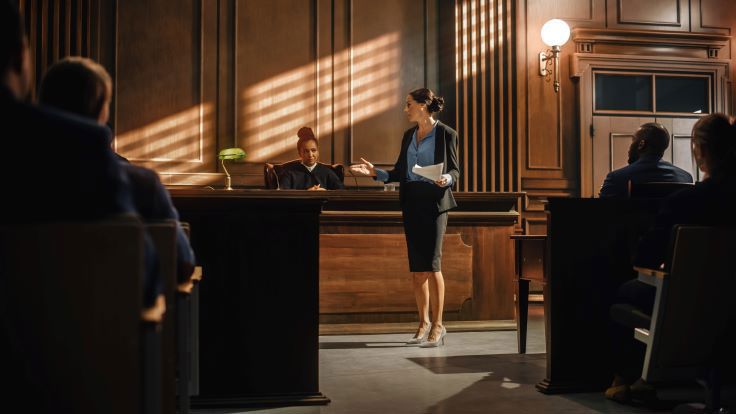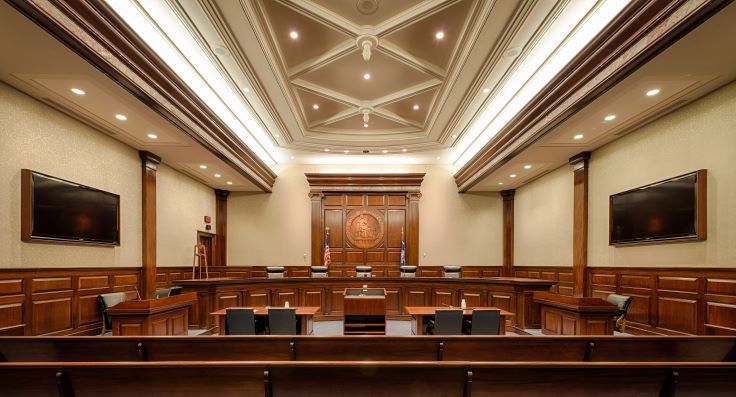
Lawsuits Against Government Agencies
Dealing with Government Agency Decisions: Can You Take the Government to Court?
Government Agency Decisions
In this article I will explain how you can get a judge to take a second look at, and even potentially
overrule, a decision made by a government agency. I will also tell you why, if you think the decision of the
agency, may harm you, you should, very early in the process, find an attorney to help facilitate a judicial
review of agency decisions, and you should make sure that your attorney understands the many ways
that cases of this type are very different from the typical civil case. In this article I will outline five key
differences.
How do Lawsuits Against Government Agencies Come About?
Every day in our Waterfront Property Law legal practice we help clients who care deeply about a decision that is going to be made by a government agency. They have much invested. The decision, when it comes, will please them or anger them, benefit them or hurt them, bring them money or cost them money, improve or hurt their quality of life. These situations arise in situations so numerous as to be impossible to catalogue, but here are a few examples drawn from our years of practice:
- Flooding Due to Stormwater Mismanagement - Consider the 250+ homes, in a neighborhood of 400 acres, where the first floor routinely floods, damaging flooring, furniture, electrical systems and drywall, yet the proposed stormwater management solution is “on hold”, and may be abandoned, because of a court challenge pending against a wetlands permit issued by an agency the federal government. Read more about this case here.
- Challenging Permits for Visual Obstructions - Think about the waterfront property owner who does not want the neighbor to build the pier that takes away the view for which the property owner paid so much money to enjoy. That pier project cannot go forward without permits from several government agencies, federal, state and local. A person can challenge any or all of these permits, if issued, in court.
- Permit Denial for Waterfowl Hunting - What about the duck hunter who owns waterfront property yet the government agency, or worse a combination of government agencies, refuse to issue the permit that is needed for him or her to erect a stationary blind on shore or in the nearby public waters. The waterfront property owner can challenge in court the government agency’s decision to deny the permit application.
- Authorization on Sand Removal - You might even mull over the dilemma faced by scores of beachfront property owners in Sandbridge Beach whose homes were being swallowed by encroaching sand dunes, yet they were threatened by local authorities with prosecution and fines for removing the sand off of their property. The homeowner, if fined or otherwise sanctioned by the local government, can challenge the agency’s decision in court.

Shutterstock: Gorodenkoff
Taking the Government to Court: Key Differences and Challenges
In the usual civil court case two people, or business entities, sue one another. It begins when one person, the plaintiff, files a “complaint” with the court, against the other person, the defendant. The defendant files a response with the court, after which there are motions, hearings, pretrial discovery proceedings, and eventually, unless the case settles out of court, there is a trial with witnesses, documents and, if the parties want one, there is a jury to decide the facts of the case based on the legal standard known as “preponderance of the evidence” (i.e. the “more likely than not” standard).
Difference #1: The Parties to the Lawsuit
The first and quite obvious difference in the court review of an agency decision to either grant or deny a permit is that the waterfront property owner brings suit against the government agency instead of bringing it against another person. Using the legal system is an expensive undertaking. Voltaire is quoted as having once said “I was never ruined but twice: once when I lost a lawsuit, and once when I won one.” You should be aware that the government, when it litigates, has a deep well of resources at its disposal.
Difference #2: There is no Jury
A judge, without a jury, presides over all parts of the judicial review of agency decisions that reviews a
government agency decision. This streamlines the trial of the case in many respects because it
eliminates the time and expense of jury selection at the start of the trial, and the time and expense of
instructing the jury at the close of the trial. Many people believe that decisions made by a judge are less
prone to sympathetic influences, as compared to decisions made by a group of laymen and women sitting
on a jury.
Difference #3: The “Administrative Record”
There are no witnesses in the court review of an agency decision. The reason for this is that the agency that made the decision simply bundles up all of the documents that it used during the decision-making process and sends them to the court. This collection of documents is the “administrative record”. It forms the entirety of the evidence before the court. A person planning to sue the agency in the event of an adverse decision will find himself or herself hamstrung in court if he or she failed to put before the agency the documentary evidence needed to support what would otherwise be a winning argument in court. For this reason, the failure to participate in the agency decision making process – and participate effectively – often time will doom the chance of winning in court.
Difference #4: The Arbitrary and Capricious Standard of Review
When there is evidence for and against a given factual issue, the courts in the typical civil case use the
“preponderance of evidence” standard. Not so in a judicial review of agency decisions where a person
sues to challenge the decision made by the government agency. The government agency benefits, some
say greatly, from the “arbitrary and capricious” standard of review, an approach that puts a rather heavy
thumb on the scale in favor of the agency. So long as there is “substantial evidence” in the administrative
record to support the agency’s decision, and the agency adequately explained its decision, the court will
not substitute its judgment for that of the agency. Again, the failure to participate in the agency decision
making process – and participate effectively – often time will doom the chance of winning in court.
Difference #5: If You Win Your Case Against the Agency You Can Probably Recover at Least Some, if Not All, of Your Legal Fees From the Agency
In the typical “civil” lawsuit, each side pays its own legal fees. However, if a person persuades the court, on the basis of the evidence in the “administrative record”, that the agency decision was “arbitrary and capricious”, the court will overturn the agency decision and require the agency to reimburse the successful litigant some or all of his or her legal fees (which can be substantial).

Shuttestock: Nagel Photography
Conclusion on Lawsuits Against Government Agencies
These five crucial differences between the typical civil lawsuit and judicial review of agency decisions
brought to challenge an agency decision highlight the importance of early involvement by an attorney
well-versed in litigation of this type.
The attorneys on our Waterfront Property Law Team have strong connections, significant legal experience and go the extra mile for our clients to get the job done, to include successfully defending an important wetlands permit in federal court in Norfolk. A few years ago one of our attorneys kicked off his shoes and got in the water to fend off a criminal enforcement action. The attorney got soaked in the process, but he protected our client from facing criminal charges. Contact us to get the help you need from attorneys who go the extra mile to serve you.
